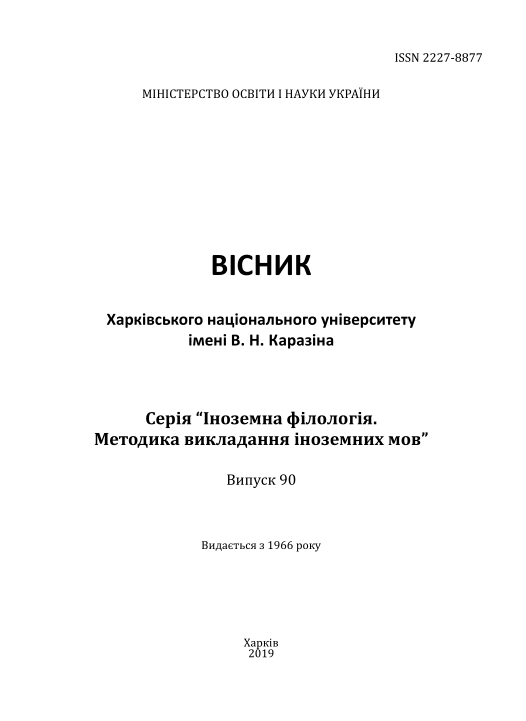Cognitive Operations in Discourse of German Folk Tales
Abstract
The article provides an overview of the main approaches to studying cognitive operations in discourse of German folk tales (Volkssage in German) based preliminary on works by R. Langacker, Kövecses Z., and G. Lakoff. It describes two paradigms in cognitive operations. The first of the mentioned ones uses cognitive mapping to study German folk tales, the second one preserves usage of cognitive operations based on cognitive grammar: specificity, focusing, prominence, and perspective. The paper gives a detailed description of the presented cognitive operations and describes their unique features in the discourse of German folk tales in relation to the SUPERNATURAL text concept. The used cognitive operations based on the fundamentals of cognitive grammar and the given description of different types of mapping build an instrument of producing and handling the folklore discourse. The following types of mapping are taken into consideration: the attributive, the relative, the situative, the substitutive, and the contrastive ones. The attributive, the relative, and the situative, types of mapping are typical for different types of metaphor. The substitutive mapping occurs when metonymy and periphrases are used. The contrastive mapping is a companion when means of oxymoron, antithesis, hyperbole and zeugma are used. The article proves that the genre of German folk tales can count most of the types of the fictive projecting which are to be found in cognitive operations of mapping and that they are making the cognitive mechanism of the folklore discourse more precise. The two paradigms of cognitive operations described in the article (mapping and cognitive operations based on the cognitive grammar) complement each other and provide a deeper understanding of the cognitive base of the German folk tales.
Downloads
References
Byelyexova, L. I. (2002) Glosarij z kognityvnoyi poetyky. [Glossary of cognitive poetics]. Kherson.
Belozerova, Ye.M. (2015) Analiz rechevogo akta namekanija v svete kognitivnoj grammatiki R. Lenekera. [Analysis of implying speech act in terms of R. Langacker’s cognitive grammar]. Visnyk Kharkiv. nats. un-tu im. V.N. Karazina. – V.N. Karazin Kharkiv National Univ. Messenger, 1155, 23-27 (in Russian).
Bondarenko, Ye.V. (2014) Kognitivnaja metafora vremeni v pojeticheskom diskurse: Transformacija metaforiki U. Odena v tvorchestve I. Brodskogo [Cognitive metaphor of time in poetic discourse: Transformation of W. Auden’s metaphorics in J.Brodsky’s works]. Russkaya filologiya: Vestnik Kharkiv. nats. pedag. un-tu im. G.S. Slovorody. – Russian philology: G.S. Skovododa Kharkiv National Pedagogic Univ. Messenger, 3 (52), 1–6 (in Russian).
Gavrilova, T. A., and Horoshevskij, V. F. (2000) Bazy znanij intellektual'nyh system. [Knowledge bases of intelligent systems]. Saint Petersburg.
Goncharuk, O. M. (2010) Kognityvni operaciyi u dyskursi anglomovnoyi bajky. [Cognitive operations in discourse of English fables]. Visnyk Kharkiv. nats. un-tu im. V.N. Karazina. – V.N. Karazin Kharkiv National Univ. Messenger, 930, 31–36.
Zhabotinskaja, S. A. (2009) Onomasiologicheskie modeli i sobytijnye shemy. [Onomaseological models and event schemes]. Visnyk Kharkiv. nats. un-tu im. V.N. Karazina. – V.N. Karazin Kharkiv National Univ. Messenger, 837, 3–14.
Selivanova, O. O. (2006) Suchasna lingvisty`ka. [Modern linguistics]. Poltava: Dovkillya.
Der Listige Schmied und andere Volkssagen um Stände und Berufe aus dem Brandenburgischen. Berlin. 1989.
Kövecses, Z. (1997) Metaphor: Does it constitute or reflect cultural models? Metaphor in Cognitive Linguistics. Selected Papers from the Fifth International Cognitive Linguistics Conference, 167–188.
Lakoff, G. (1993) The contemporary theory of metaphor. Metaphor and Thought, 202–251.
Langacker, R. W. (2002) Discourse in Cognitive Grammar. Cognitive Linguistics. 12-2. P. 143–188.
Langacker R. W. Foundationsof Cognitive Grammar. Vol. 1: Theoretical Prerequisites. Stanford : Stanford University Press. 1987. 540 p.




